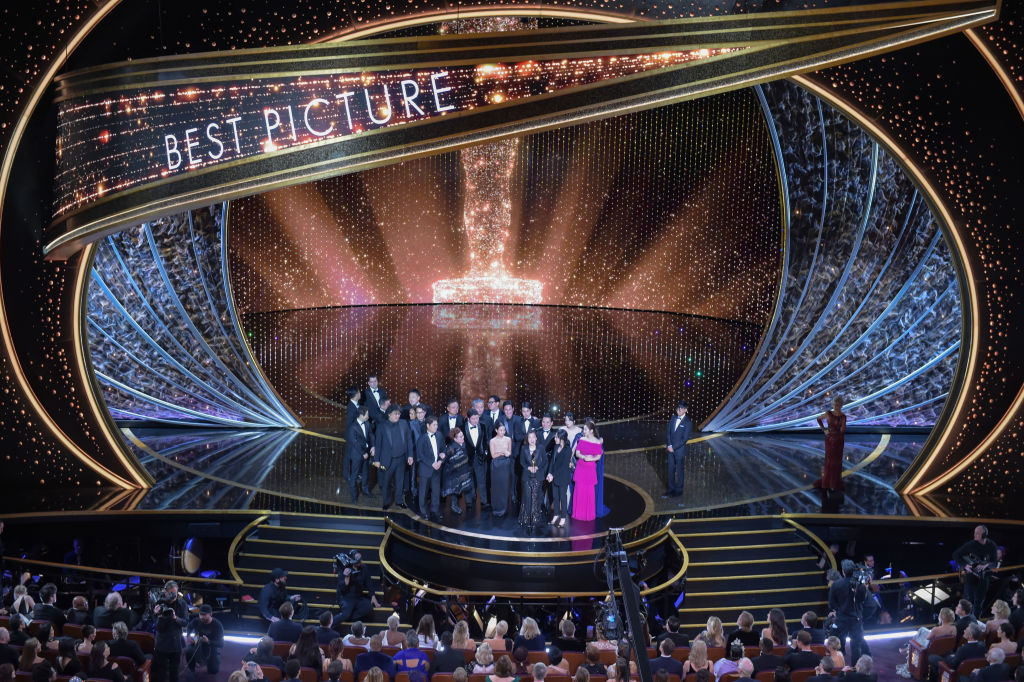‘Parasite’: Why Many Reactions to the South Korean Film Winning Best Picture Are So Disturbing
At the 2020 Oscars, The Academy awarded four statues to Parasite. The Bong Joon-ho-directed film became the first-ever South Korean film to win Best Picture, as well as every other award it earned–because shockingly, a Korean film had never even been nominated before. (That includes the international film category).
But at least Parasite cleaning up at the Academy Awards is a good reminder to American moviegoers: foreign films can be just as artistic and great as American ones. However, many Oscar viewers didn’t feel that way. Parasite‘s wins were clouded by anger, confusion, and flat-out racism by people on the internet reacting to the awards. Some admitted that had not even seen Parasite, but were unhappy with the way Joon-ho accepted in the Oscars (you know, in his native language: imagine!). All of it is steeped in a very problematic and U.S.-centric narrative. It was disappointing to see that movie-lovers couldn’t appreciate the fact that the Academy Awards finally gave a long-overdue nod to South Korea, which has been churning out fantastic films for decades.

As it turns out, people are still racist in 2020: some reactions to the 92nd annual Academy Awards were rough
After Parasite director and screenwriter Bong Joon-ho won the Oscar for Best Original Screenplay in February, a conservative TV host named Jon Miller took to Twitter to complain about it.
“A man named Bong Joon Ho wins #Oscar for best original screenplay over Once Upon a Time in Hollywood and 1917,” he tweeted. “Acceptance speech was: ‘GREAT HONOR. THANK YOU.’ Then he proceeds to give the rest of his speech in Korean. These people are the destruction of America.”
Yikes, could it get any worse? (Luckily, most tweeters disagreed with Miller).
After receiving boatloads of backlash, Miller followed up with a response: “‘These people’ are obviously not Koreans but those in Hollywood awarding a foreign film that stokes flames of class warfare over 2 films I thought were more deserving simply to show how woke they are. That should be clear from the rest of what I tweeted about tonight’s production.”

Sir, it was clearly not clear. But we’d also like to note: 1917 is a foreign film, it’s just British. It’s not too hard to see why this man was upset with someone speaking another language on his television screen. But whew, imagine watching Parasite and thinking it was “stoking flames of class warfare,” instead of just commenting on the very disturbing realities of wealth inequality and classism. Imagine! Art is difficult, we suppose.
Have you even seen ‘Parasite’, bro?
Another disgruntled Oscars viewer ranted on his YouTube channel about Parasite winning Best Picture, mostly angry that it was a foreign film that had won over Joker. (He said he wouldn’t have cared if Little Women had won, but somehow, we doubt it). Partway through the video, he admits he is making this long video to complain about Parasite winning Best Picture, and has not even seen the film.
Writer Dana Schwartz had a great point on the guy’s video:
“I love how this guy hates Parasite and loves Joker because Joker is about how people in high places look down on people in poverty,'” she wrote. “This guy should really see Parasite!”
Based on these responses, it’s high time Americans start seeing some movies outside of Hollywood. We think they’d actually like it!
What do the Oscar victories for ‘Parasite’ mean for Asian-Americans?
After Parasite‘s Oscar sweep, Walter Chaw of the New York Times wrote an opinion piece about the mixed reactions to the wins. As an Asian-American, he understood the value of celebration–but felt discomfort about a lot of the response. Chaw wrote:
The victory of Parasite is a stunning moment that may not also be a watershed moment. It’s certainly cause for celebration that an organization with notoriously questionable taste seems to have gotten it right this year, and it’s unquestionably huge for the South Korean film industry.
He saw Parasite and Joon-ho’s Oscars successes as the Academy compensating for many years of it snubbing South Korea altogether.
“This is merely Hollywood recognizing, very belatedly, South Korea’s amazing film industry — which has been making superlative films for decades,” Chaw continued. He said neither side of the political spectrum was responding appropriately.
Is ‘Parasite’ winning Best Picture a sign of a push towards inclusivity and diversity at the Academy Awards?
“For the left,” Chaw wrote, “the victory of Parasite represents a validation of diversity initiatives undertaken by the Academy of Motion Picture Arts and Sciences in recent years.” In the editorial, he mentions “prominent Asian-American film critic Justin Chang of The Los Angeles Times,” who wrote that Parasite‘s victory was: “a sign, perhaps, that the academy’s efforts to diversify its ranks and become a truly global institution.”
On the other side of it, the conservatives are playing up the fear factor.
“For the right, it’s more fuel for the fear machine, “Chaw wrote. “It’s evidence of, if not the beginnings of a new Yellow Peril, a progressive media conspiracy to frustrate conservatives’ pursuit of an increasingly authoritarian nationalism.” He also mentioned Jon Miller’s disturbing tweet.

However, Chaw argued, the belief on the right, that “the film’s awards were a craven effort by the academy’s voters to … atone for this year’s repeat of a near-#OscarsSoWhite repeat probably holds some kernel of truth as well.”
Therefore, Chaw says he’s “hesitant to give too much credit to the academy for its sudden interest in ‘inclusion.'”
Considering it was only about 365 short days about that Green Book won Best Picture, we’re not either. But we hope Parasite‘s victories start a trend towards diversity at the Oscars; the Academy badly needs it.


